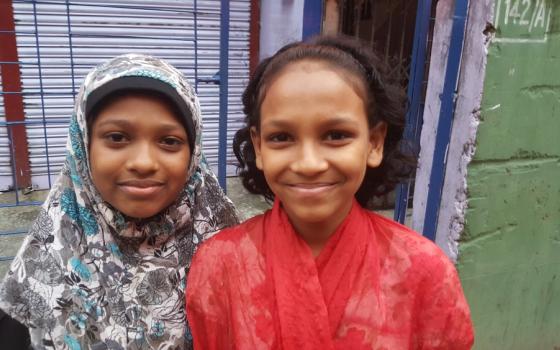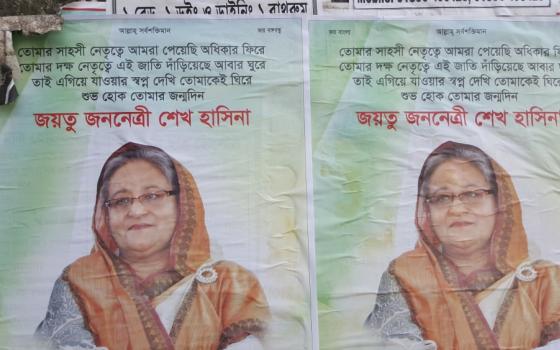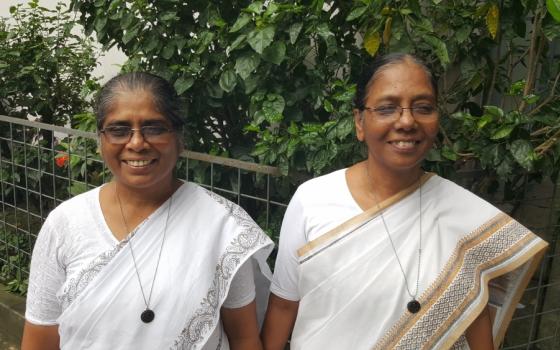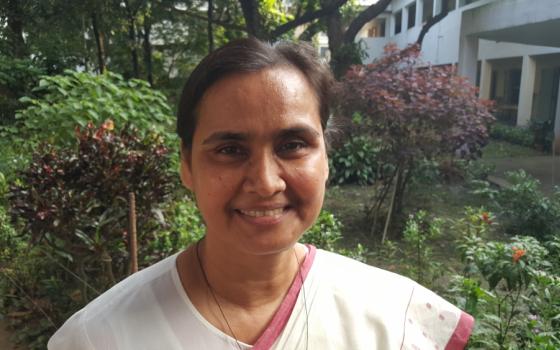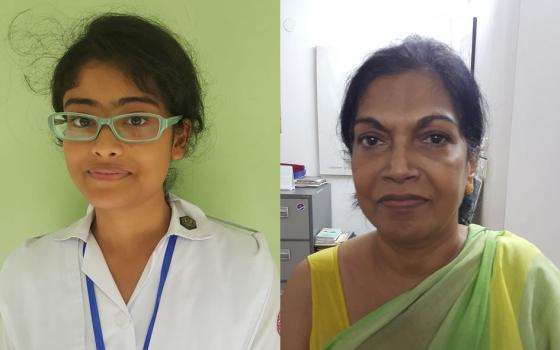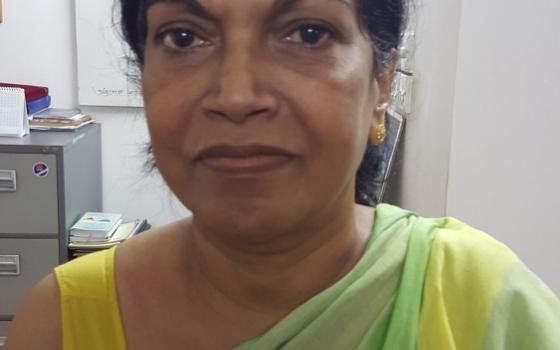Bangladesh is a country often lauded by outsiders for its progressive policies towards women — at least on paper.
The country's 1972 constitution enshrines gender equality, and subsequent laws, such as a 2010 domestic violence prevention and protection act, are also on the books.
One touted point of pride is that women serve both as prime minister (Sheikh Hasina) and the leading opposition leader in the Bangladeshi parliament (Rowshan Ershad).
Yet in what continues to be a notable and dismaying paradox, women in Bangladesh face serious challenges, not least being the scourge of domestic violence.
As one example, a much-discussed survey conducted by the Bangladeshi government determined that nearly nine out of 10 — 87 percent — of Bangladeshi women have experienced some type of gender-based violence in their lives.
In the midst of such challenges, Catholic sisters — members of a minority religious group in a predominately Muslim country — have been leaders for women’s equality, though perhaps more for their quiet but still-visible life example than for their outright advocacy.
But example can be powerful.
"I wanted to be free, to make my own decisions in life," said Holy Cross Sr. Pauline Gomes, head of student affairs at Holy Cross College in the capital of Dhaka. "The freedom to serve, the freedom to be who you are" have been key elements in Gomes' life and the lives of her fellow sisters.
And yet, despite the prominence of such institutions as Holy Cross, there is a reluctance in the larger society "to see girls educated," Gomes said. Male-dominated relationships and the inability of men to cede power to women, remain daunting forces in Bangladesh. "Women are still not in many jobs," Gomes said, and their "expected" role is still largely seen as confined to the household.
Yet, Gomes and her colleagues believe — and rather passionately — that, as Gomes puts it, "It is very important for girls to be educated."
Gomes' colleague, Sr. Violet Rodrigues, an English instructor, puts the issue in a larger context. "I don’t think it will work out if girls are not educated," she said. "How else can the country develop? If you don’t educate them, the country will be crippled."
While not diminishing the importance of household work — which the Holy Cross sisters said should be shared with men — they believe that gender equality means that women should have equal access to opportunity. "You can blossom," said another of Gomes' colleagues, Sr. Pushpa Teresa Gomes, Holy Cross coordinator for Asia.
Yet it is in the home that many problems simmer and fester — or become worse.
As one domestic worker who has received schooling and training at the Catholic-run Carlotta Center in Dhaka put it, "After marriage there is often a 'husband problem.'" She added: "Home is supposed to be the safe place, but it is often not."
In March of last year, advocates and activists attending the United Nations' Commission on the Status of Women meeting in New York spoke frequently about a government survey that revealed the high incidence of gender-based violence in Bangladesh.
As outlined by Ayesha Khanam, president of the advocacy group and women’s shelter Bangladesh Mahila Parishad, known as BMP, nearly 90 percent of married women had reported some kind of violence, either physical or psychological, by their spouses at some point in their marriage. Nearly eight out of ten said they had experienced some kind of violence in the last 12 months of the year under question, 2011.
The study pointed out that psychological violence was more common than physical violence. And yet an appendix to the study — of records kept by the BMP's legal aid unit — found that an increase of reported rapes, from 393 in 2009 to 666 in 2014. The number of reported gang rapes in 2014 was 174, nine fewer than the 185 reported in 2013, but still higher than the 146 reported in 2009.
Deaths by acid burns and murder for dowry all increased over six years (2009-2014), as did torture by police and the overall number of reported sexual assaults. At the same time, the number of "fatwas," or legal opinions, against women issued by muftis or other jurists declined by almost half, from 48 to 29 — this at a time when many are concerned about the growing influence of conservative Islamist ideology in the country. Also declining were kidnappings of women, from 306 in 2009 to 118 in 2014.
To advocates like Rokeya Kabir the study confirmed some of the serious hurdles and problems women continue to face in a male-dominated culture.
"Women have progressed a lot," said Kabir, 64, founder and executive director of Bangladesh Nari Progati Sangha, an advocacy group founded in 1986 to change national policies and push for legal reforms. "But there is still a long, long way to go."
At the least, the economic changes in Bangladesh that have caused families to migrate to urban areas have put women in the cities workforce — though in rural areas, women still do much of the work on farms, particularly on small farms.
But subsistence farming is under pressure in the wake of commercial "land grabs," causing problems for both female and male farmers. "Subsistence economic space, like small farming, is being squeezed," she said. People could once live off the land and maintain levels of "food security," or access to food. But the power of commercial interests means that “people are losing access to land. There is a lot of exploitation.”
That is serious enough. But the pressures on women have increased, with men still not often helping with household work. As a result, women now face "triple, even quadruple pressures," Kabir said. They must support families, maintain households, do much of the raising of children, and take care of elderly parents.
And of course, there are economic class issues at play. While educated women still struggle to get professional jobs, women with less education have little alternative but to work in the growing garment industry.. Though the garment industry has provided economic security for a growing segment of women, the time and physical demands put on women who work in it has also placed pressures on how to best take care of children. "Their world changes," Kabir said.
Though the industry represents a modernizing element, old traditions do continue — one of them being the continuing the practice of under-aged girls being married off, often to older men. "Children still face big challenges," said Holy Cross Sr. Rani Catherine Gomes, headmistress of the Holy Cross Girls High School.
All of these changes have caused serious social dislocation, and new social norms, such as the more frequent wearing of the hijab. Some argue the head scarf serves as a kind of emotional protection, and others as peer-pressure-influenced fashion, particularly as more Bangladeshi men work in the more conservative Middle East and return home with stricter ideas of what constitutes proper behavior for the sexes.
The uptick in violence may be due to women feeling increasingly emboldened to report it. "There is a lot of violence inside the home," Kabir said, "but the silence is breaking."
And though women’s equality is often seen as a Western issue and is not part of the everyday discourse in the country, “all religions are patriarchal,” not just Islam, she said.
The need to protect secular values is important so that women get space, Kabir said. "We want a society of non-discrimination and of women’s empowerment." She said recent events, such the murders in 2015 of several "free-speech" bloggers and advocates, means a lot is at stake now in Bangladesh. "It's life-threatening now," Kabir said when asked if she felt women’s organizations were, in a sense, "under siege."
Citing the murders of the bloggers, Kabir, herself Muslim, said those who openly question conservative Islamic practice feel isolated and threatened, calling it a "critical situation."
The pressures are not just being felt by women. A male volunteer with Roopbaan, one of the country's few gay and lesbian rights organizations, said that "for anyone who has a different point of view from the religious point of view, it is becoming difficult."
"In the Bangladeshi context, there is still a large segment that is tolerant (about religious issues),” said the volunteer, who does not want to be publicly identified. But there is a growing segment that has started to base public arguments on the belief that God condemns homosexuality.
"It is being used as an excuse," the volunteer said, adding that public attitudes on issues such as homosexuality and diverse religious stances have probably already started to stiffen. "It may get worse before it gets better."
At the heart of such concerns is the fear often expressed by those in the Catholic community in Bangladesh that the influence of conservative Islamist ideology is possibly undermining a cherished secular tradition that has provided a measure of safety and freedom for non-Muslims to practice their religion. A cornerstone of that tradition has been the ability of Catholic orders, of both women and men, to do their work of contributing to the greater good of Bangladeshi society – whether it be in education, humanitarian work and health care.
"There is a matter of fear right now," said one prominent Catholic educator, noting the country’s more traditional liberal tradition may be changing. "We don't want the country to become an Islamic state."
At Holy Cross, more young girls are wearing the hijab to school, though they are are required to only wear the school uniform while on campus. "You are a student — that is your identity, no matter what your religion is," said Rodrigues. The school continues its policy of encouraging open discussion about religious inclusion and pluralism — with attention paid in particular to Islamic, Christian, Hindu and Buddhist traditions.
"I feel like those who attend Holy Cross have respect for other faiths," Pushpa Teresa Gomes said, affirming the school's — and the country's — tradition of religious tolerance. "We are Bangladeshis."
Rodrigues added that such an emphasis is achieved by emphasizing "humane, morale values" rather than expressly religious ones. "I think they learn from us," she said of her students. "We hope that, in the future, they go out into the world with good hearts."
Gomes' and Rodrigues' charges are young women like Kaifi Sultana, 18. To her, progress for women is both real and elusive. As a student at Holy Cross College in Dhaka, she has applied to the California Institute of Technology for her undergraduate studies. "There are still obstacles — many in fact" for girls and women, she said. "The society doesn’t support us all of the time."
Her ultimate dream? If Sultana does attend school in the United States, she envisions a return to Bangladesh to serve her country. And she hopes things improve for women and girls — that women, with their multitude of talents, be accorded real respect that goes beyond the superficial.
"To be a real human being with ethics and values — and respected," she said of women’s aspirations. "Women's empowerment is the biggest challenge. We should be given more chances to prove ourselves."
Pauline Gomes could not agree more.
She is proud of what she sees in her students — signs of empowerment amid Bangladesh's many problems.
"Women still suffer in our country," she said, "but our students can stand up, stand up for themselves and for society."
[Chris Herlinger is GSR’s international correspondent and also writes on humanitarian and international issues for NCR.]
